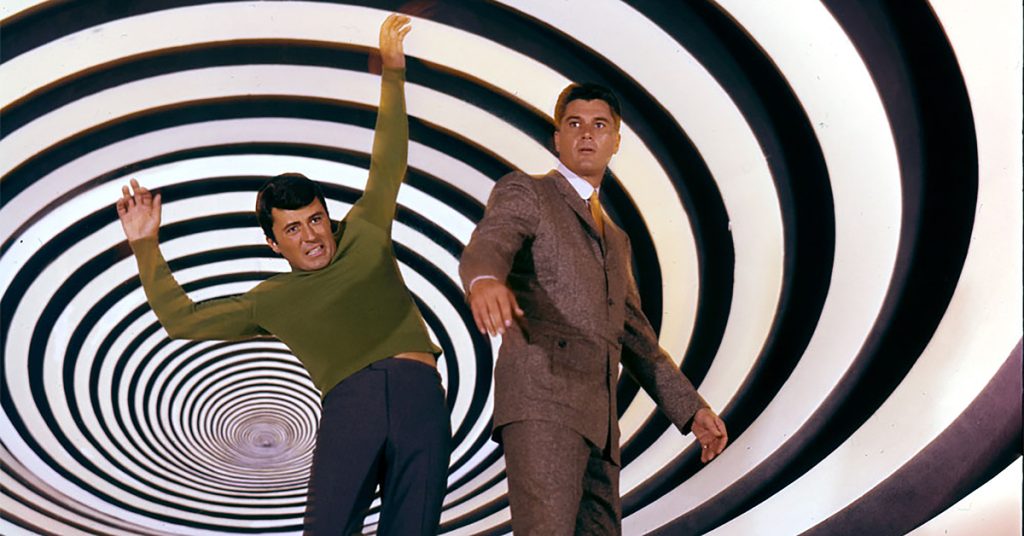Who owns the past, anyway? For that matter, who owns the future?

Do you ever find yourself cringing at movies and stories where a time-traveling hero ends up in the past only to have neglected the details of the intervening history? Based on Santayan’s adage that those who cannot remember history are condemned to repeat it, this well-worn story pattern is usually credited to Mark Twain, who in 1889 published A [Connecticut] Yankee in King Arthur’s Court about a 19th-century American engineer banged over the head to wake up in England over a dozen centuries earlier. In the spirit of Arthur C. Clarke’s future adage that any sufficiently advanced technology is indistinguishable from magic, the engineer passes himself off as a grand wizard whose exploits win him a modicum of fame while bailing him out of a major jam. In the novel’s climax, the engineer terrorizes his critics by pulling the hour of an imminent solar eclipse out of his hat to save himself from a violent mob.
In an ironic twist, a writer named Charles Clark claims that Twain’s popular tale, since reprised in numerous motion picture and television episodes, was a case of Twain’s misremembering his own past. According to Clark, his 1883 story The Fortunate Island, published six years ahead of Twain’s, was similar enough in theme and plot to call into question Twain’s originality. Their unresolved conflict begs similar questions today:
Who owns the past, anyway? Those who live it or those who (mis)remember it? For that matter, who owns the future?
Ask yourself this version. If you were transported back to 1999, how much of the intervening quarter-century would you be able to profit from? By profit, I don’t mean capturing capital gains realized from shares of Amazon or Bitcoin bought in their obscurity. I’m asking how much knowledge of the past you could readily apply to future problems.
Twenty-five years ago, I was asked by the CIO of a large hotel company to assess the value of his company’s vast technology portfolio going into the coming century. His accountants had already told him how much stuff he had and at what cost over the years. What he needed to know was how relevant his portfolio would be to the business problems it would be asked to solve in the coming century.
(How would you have gone about answering him?)
The best I could come up with was to distribute his current expenditures across the technologies amassed over the previous three decades that were still in operation. As rudimentary as that analysis turned out to be, its results stunned, though did not surprise, my client. Who knew that the bulk of his present spending went to prop up technologies that were at least two decades out of date?
As I have cited before in this column, Albert Einstein, the first scientist to put technical meat on the bones of the hypotheticals of Twain’s and Clark’s adventures in time travel, challenged us not to approach today’s cproblems with the same level of thinking that created them. To beat Time at its own game, we must learn to travel through it.
In yet another twist of time, midway between Clark’s and Twain’s publication dates, Jules Verne brought to market a short story called The Chronic Argonauts, which by 1888, a year ahead of Twain’s novel, would be expanded to become Verne’s classic The Time Machine. In that story, the standard by which all future time-traveling speculation would forever be judged, Verne’s ‘tempus fugitive‘ explores not just the potential for the present’s prescience to persuade the past but for those of us grounded in the today to consider certain parameters of tomorrow. Nearly a century later, Jules Verne’s successor, Ray Bradbury, who shared the story with me before it was published, punctuated in The Toynbee Convection the value of traveling into the future without the aid of a machine. Without overly spoiling Bradbury’s climactic twist, imagine imagining the future and then passing your imagination off as present fact. As Oscar Wilde prods us, is not such the proper aim of art?
Not just this New Year, but every morning when we face the future while still remembering the past, consider what Twain, Clark, Verne, Einstein, and Bradbury knew, ahead of most, and that John LeCarre told us before he recently joined his own future.
“Tomorrow was made yesterday, you see…To ignore the past is to ignore the wolf at the door.”
What century are you in?
This post is from a series of “Declarations of Being & Becoming,” originally written as part of a LinkedIn Newsletter called Say the Change. You can access the entire series here.



I’ve read H.G. Well’s *The Time Machine*, but not his earlier short story “The Chronic Argonauts”. https://en.wikipedia.org/wiki/The_Time_Machine
Similarly, I’ve read Twain’s A [Connecticut] Yankee in King Arthur’s Court, but not Charles Clark’s earlier “The Fortunate Island”. I’m happy to report that my awesome library has an ebook of “The fortunate island, and other stories”, which I’ve bookmarked for when I get through some of the long-suffering books that are already glaring at me to finish them already (most recently completed: Martha Wells’ *Network Effect* SF novel).
If I were transported back to 1999, knowing what I know now, I think many of our problems are systems problems (beyond technological problems), requiring people to work together better than we’ve been able to in the last 20+ years. There have been people warning about our current batch of problems since pretty much the start, but they haven’t had the influence to get much traction. I guess I’d try to help them spread the word, maybe with stories to capture the imagination.
Sarah, thanks for you thoughtful comment. I was beginning to wonder if you had suggestions for fruitful for collaboration when I read your idea that stories of collaboration aid the imagination. I like that thought. And what a library you must have! Do you have A Medieval Romance? It’s my favorite Twain story, along with The Man Who Corrupted Hadleyburg, both are wicked social commentaries as only Twain can pull off–even though he couldn’t figure out how to end one of them.
I was unclear, Scott. By “my library” I meant Montgomery County Public Library System, which has an excellent science fiction curator, among other good qualities. They have a number of hopepunk/solarpunk SF titles which are about groups and communities working together for common good. I’ve now also bookmarked their ebooks of “A Medieval Romance” (in a classic mystery anthology with multiple authors) and “The Man Who Corrupted Hadleyurg”. Impressively, they have a Farsi-version audibook of TMWCH! though I’m sticking with English.